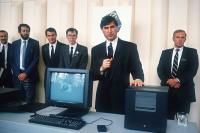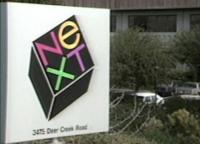Marissa Mayer founded Lumi Labs
Marissa Mayer, ex CEO of Yahoo, founded a company, Lumi Labs, together with Enrique Muñoz Torres.

According to the company website www.lumilabs.com:
Lumi Labs is an early-stage technology studio founded by Marissa Mayer and Enrique Muñoz Torres, based in downtown Palo Alto. We are focused on building consumer applications enabled by artificial intelligence. If you are interested in joining us in developing some projects and prototypes, we're hiring
Right now, we're looking for full stack and machine learning software engineers who could be based out of our downtown Palo Alto, California office. We are not prescriptive about preferred languages or technologies, as long as you feel comfortable prototyping end-to-end applications. If working in a fast-paced environment where you will play a key role both in ideation and in implementation sounds interesting to you, please apply to work with us.
If you don't fit that profile but you're interested in working with us, please shoot us a note too. Even if now is not the right time, we'd love to stay in touch!
In a tweet from April 18 Mayer wrote:
Thinking about what's next, I returned to my roots, rented the original Google office where I started my career, and founded a lab with my longtime friend and teammate @eamunozt. A bit of info: http://www.lumilabs.com
Mr. Torres reply on the same day with the tweet:
Really excited to start this with my mentor and friend @marissamayer! We have some really intriguing ideas and can't wait to hire awesome hackers to build some prototypes. recruiting at http://lumilabs.com .

Here is the interview published by The New York Times (https://www.nytimes.com/2018/04/18/business/marissa-mayer-corner-office.html).
What are you up to now?
I rented the old Google office. So this is actually the office where I started my career in 1999. This is also where PayPal started, so there’s a lot of good juju here.
Coming back here, it reminds me of what Google felt like in those early moments. I remember running up those steps, because if you didn’t get here fast enough on Saturday morning, someone in the world was going to get worse search results, and it might change their life for the worse.
So you haven’t joined a company or founded a company yet?
We have this little lab that we’re working on called Lumi Labs. In Finnish, lumi means snow, and I just love snow. I had a snowflake-themed wedding. We have some ideas in the consumer space. So I’ve been meeting with different founders and just seeing what’s happening in the industry.
What kind of managers were Larry Page and Sergey Brin during the early days, and how did you think about developing your own management skills?
Larry and Sergey just yelled at us until we became what they needed us to become, and get done what they needed to be done. And so I said, look, I’m going to just rinse and repeat that, hopefully with less yelling. We ultimately brought in management coaches and all kinds of mentoring.
I think you can have high expectations as a leader, and as long as they’re consistent and clearly communicated, a lot of people find that really inspiring. I always knew what Larry and Sergey wanted. I knew what good looked like to them, and so I never got discouraged by them saying, “Wait, I don’t think this is ready” or “I think this is overly ready.” At a start-up you never really know when should you launch something. So Google built the philosophy of launching early and often. Try things out and see what works.
As Google grew, how did you work to maintain a cohesive culture?
There are different phases of companies. When you’re in the tens of people, the idea itself either attracts people or it doesn’t. People are there because they think the problem you’re trying to solve is just that important.
The next phase is where it’s really critical and it’s hard. Getting from 100 employees to 1,000, you have to be very careful. There’s a strategy around compensation at that point, where you really want somebody who’s coming for the right reasons. To get the people who are really aligned with the mission, you want to make sure that they’re fairly compensated, but not necessarily motivated by that compensation. I had a strategy both at Yahoo and at Google of “meet, not beat.” It’s the trade-off between mercenaries and missionaries.
And then around 1,000 people, the culture and the mission become self-reinforcing. At Google I’d always ask new people, “Why did you come?” When we were about 1,200 people, all of a sudden, for the first time, I actually heard the answer, “I came for the culture.”
Why did you leave Google?
I was 37, and I had been working at Google for 13 years. I had been on search for 10 of those years and just had very recently made the change over to focus on Maps as a search technology. And I was like, “You know, I’m just not sure that I want to be like the 50-year-old search girl.”
I’d always had huge respect for Yahoo as a company. When we were here in this office, we dreamed of maybe getting the Yahoo contract, maybe one day powering Yahoo search. In 1999, Yahoo was the internet. And I knew that while there were a lot of things going wrong for the board and leadership at Yahoo, there were a lot of really good people there working on the products.
What was the best-case scenario for Yahoo when you took over?
Returning it to the pre-eminence in its users’ daily lives, where it used to be people were on Yahoo for half an hour to many hours a day. Could we get back to that type of usage?
I’m proud of what we achieved at Yahoo. That said, we had a quickly decaying legacy business. All we really managed to do was offset the declines.
Yahoo had to deal with some nasty shareholder activist campaigns, and several readers asked about your thoughts on activism. Were there upsides, or was it more of a distraction?
One of the more tragic cases of Yahoo is the Alibaba stake. Both Carl Icahn’s campaign and some of the people who were part of Dan Loeb’s campaign really wanted a commitment to see that stake sold. And Yahoo sold half of that stake in a $35 billion market cap for Alibaba, eroding tens of billions of dollars of upside. So certainly that was not positive. Sometimes that shortsightedness of wanting to get a return quickly can cause you to miss a much bigger gain.
Are there things you wish you would have done differently?
I’m really proud of how well we did. I think over all the team and the company were dealt a very tough hand. We got great results for shareholders, we got great results for advertisers and our users and our employees. And so I feel really good about that, but obviously the absolute home run would have been a stand-alone company and then a complete comeback.
What would it have taken to fix Yahoo?
I was playing with Magna-Tiles with my son one Sunday, and we had built this giant kind of castle complex, and it collapsed. And my son was crestfallen. I stopped, and I said: “There’s nothing to be upset about. We built it and it worked once, and we’ll just rebuild it.” When I said that to him, I realized that’s how I felt about Yahoo. You’re rebuilding something and you know that it worked once, so it should be able to work again.
That said, I would say one of my key learnings from Yahoo is that timing is everything. There was a time when Yahoo’s offerings could consume hours a day, and trying to regain that moment in time was really hard. We could make the products really good, but regaining that contextual relevance that was afforded to Yahoo in 1999 and the early 2000s was difficult.
With #MeToo in the news, lots of readers wanted to hear your thoughts on being a woman in Silicon Valley right now.
I think it’s an important set of conversations that’s happening. I also want to take a longer-term view. As important as these conversations are, I hope we’re able to have them in a concentrated way, fix the problems and move on from them. Because I worry about what happens to the next generation.
What we don’t want to do is dissuade that next set of leaders, entrepreneurs, executives from even entering the field. I don’t want us 15 years from now to turn around and be like, “Wait, how come there’s so few women V.P.s at all these companies? Oh, right, it’s because in the summer of 2018, there was all this happening and it caused people to make wildly different career decisions.”
Karen Lippman asks via LinkedIn ...
What are some of your tips for perseverance when the chips are stacked against you?
Develop a thick skin. Bradley Cooper, the actor, once said that if you ever want to feel really, really bad about yourself, go read about yourself online.
Being a mom has changed a lot of my perspectives in life. There’s a great children’s book called “Rosie Revere, Engineer,” about this little girl named Rosie who likes to build things. The rhyme that comes at the end is: “Life might have its failures, but this was not it. The only true failure can come if you quit.”
You’ve just got to keep at it.































